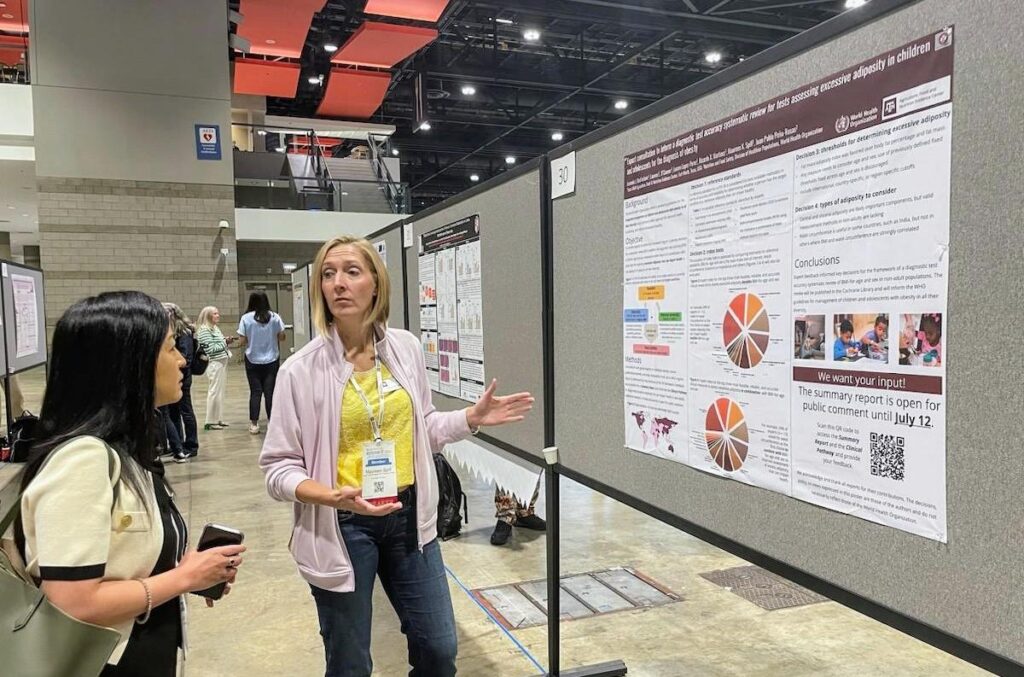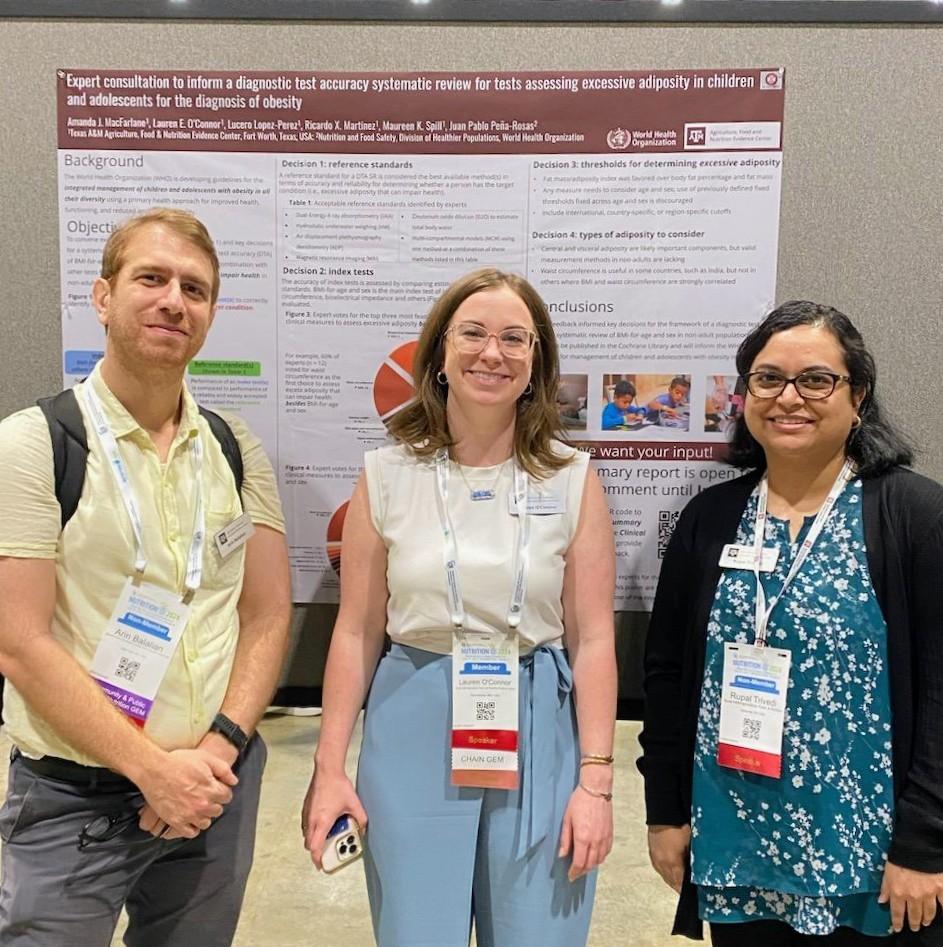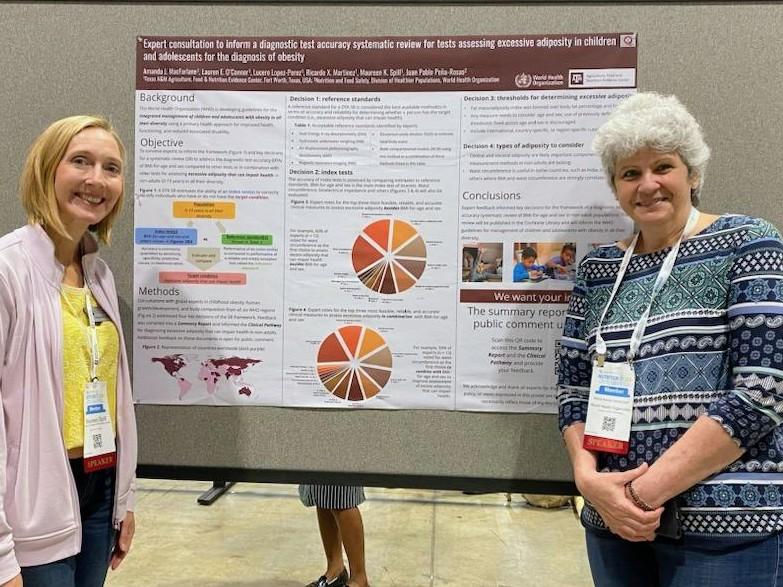Texas A&M’s Agriculture, Food and Nutrition Evidence Center presented its first series of studies, funded by the National Academies of Sciences, Engineering, and Medicine, NASEM, at NUTRITION 2024, the annual flagship meeting of the American Society for Nutrition. The conference draws the best nutrition scientists for research meetings, presentations and lectures.

Created in 2021, the Evidence Center’s mission is to produce transparent and reproducible evidence reviews and syntheses that assess the effectiveness of agri-food policies, practices and guidance related to agricultural, environmental, human and economic health.
Experts from the Evidence Center were selected to give five oral presentations based on NASEM-funded research, as well as two poster presentations based on other projects. This included a presentation by Maureen Spill, Ph.D., who was named the first associate director of the Evidence Center in May.
“It’s a big deal that the Evidence Center made its professional debut at NUTRITION 2024,” said Spill. “This conference is where the best nutrition scientists come together to drive scientific progress, leading to better policies and improved human health. The staff at the Evidence Center are proud to be at the forefront of that innovation.”
The series of studies presented is part of a National Academy of Sciences, Engineering and Medicine study that examines the current scientific evidence on the relationship between seafood consumption and child growth and development. This review will focus on both maternal and child seafood intake and its impact on various aspects of development. The objective is to obtain the latest insights into the role of fish consumption in the context of a comprehensive diet.
The Evidence Center presented conclusions


The Evidence Center completed two complementary de novo systematic reviews, which assessed the relationships between seafood consumption and neurocognitive development in children and adolescents. The first review assessed the relationships between mothers’ seafood intake during pregnancy and lactation and the child’s neurocognitive development. The results showed that seafood consumption during pregnancy may be positively related to the child’s behavior, attention and general developmental outcomes.
A second systematic review assessed relationships between seafood consumption during childhood and adolescence and neurocognitive development. Eating seafood, mainly fatty fish, during childhood and adolescence resulted in favorable cognitive development and behavioral outcomes. These findings support previous research conducted by the US Department of Agriculture to inform future dietary guidance regarding seafood intake during pregnancy.
Identify the benefits and risks of seafood in diets


Although there are nutritional benefits to seafood consumption, there is a risk of exposure to environmental contaminants. A scoping review assessed the amount of evidence examining seafood toxin exposure during pregnancy, lactation and childhood and its relationship to childhood outcomes. They identified exposure and outcome pairs with sufficient evidence in multiple studies that may warrant a systematic review and highlighted gaps in the current research literature.
Based on the results of the scoping review, a systematic review was conducted to examine the association between maternal lead exposure from seafood consumption and child neurodevelopment. Overall, the evidence did not suggest that maternal lead exposure from seafood had a detrimental effect on children’s neurodevelopment, and seafood consumption was linked to improved neurodevelopmental scores overall. However, due to the limited number of studies more research needs to be done in different populations to improve understanding of this association.
Mercury is a common contaminant of seafood and may have adverse effects on the development of children. Current systematic reviews looked at prenatal and postnatal mercury exposure and childhood outcomes. More than 20 relevant systematic reviews were included and covered all child outcomes of interest identified by the NASEM committee except academic performance and failure to thrive. Multiple reviews have addressed autism spectrum disorder, developmental and developmental domains, and most have been considered moderate to high quality.
Highest quality standards of evidence
In addition to the NASEM-funded studies, Evidence Center staff presented posters on its systematic review examining the links between free universal school meals and school and student outcomes. Poster presentations included a summary of expert consultation on the accuracy of tests that assessed receptivity in children and adolescents to diagnose obesity to support the development of a World Health Organization guideline for the clinical management of obese children.
Amanda MacFarlane, Ph.D., director of the Evidence Center, said the staff adheres to the highest standards in their work. The Evidence Center promotes scientific rigor and transparency — the cornerstone of translating scientific evidence into reproducible, evidence-based solutions to improve public health.
“This opportunity to showcase our research with the best minds in nutritional science is incredible,” said MacFarlane. “The team’s findings will inform scientists, researchers and policy makers in developing evidence-based dietary recommendations and identify topics that require further investigation, leading to improvements in human health.”
